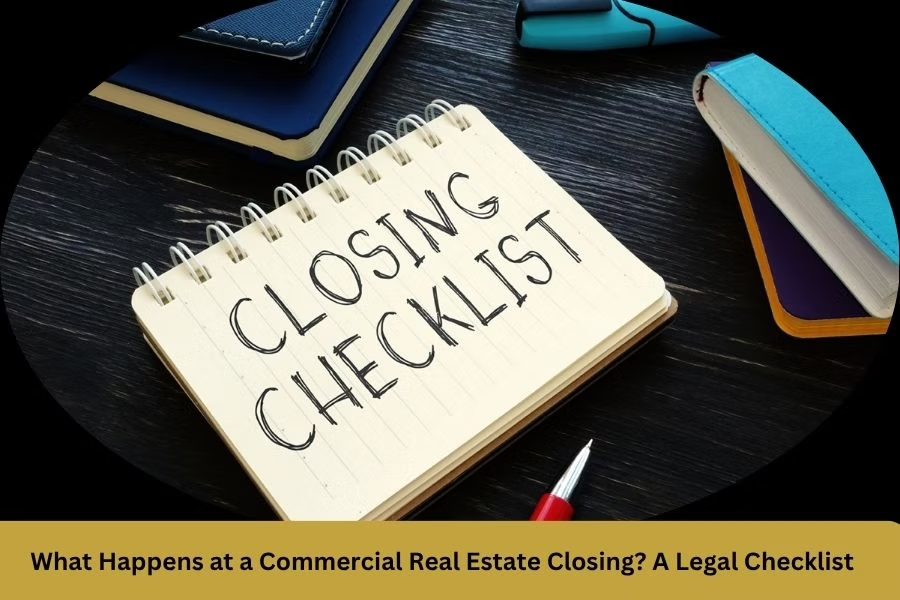Closing a commercial real estate (CRE) transaction is one of the most critical phases of any property deal.
It’s the point where ownership officially transfers, funds are exchanged, and both buyer and seller finalize the terms they’ve been negotiating for weeks—or even months.
However, unlike residential closings, commercial real estate closings involve more complex documentation, legal compliance, and risk mitigation. At The Real Estate Law Firm, we help clients navigate this high-stakes process with precision, protecting their investments and ensuring every legal box is checked.
Below is a comprehensive breakdown of what happens during a commercial real estate closing—and a legal checklist to make sure nothing falls through the cracks.
Explore trusted commercial closing support for your transaction.
1. Final Due Diligence Review
Before closing, both parties must complete a final review of all due diligence materials. This includes:
-
Title examination
-
Environmental assessments (Phase I & II)
-
Zoning compliance
-
Survey reviews
-
Financial audits of existing tenants (for income-producing properties)
Legal Tip from The Real Estate Law Firm: Ensure no new encumbrances or liens have been recorded against the property since the initial title commitment was issued. An updated title search is essential.
2. Title Insurance and Title Commitment
A commercial closing cannot proceed without a title insurance policy. The buyer must ensure the title is clear and that the final title commitment reflects all agreed-upon terms.
Key Legal Documents:
-
Final title commitment
-
Owner’s and lender’s title insurance policies
-
Clearance of any title objections
The Real Estate Law Firm works directly with title companies to resolve defects and verify that the seller’s title is marketable and insurable.
3. Reviewing the Closing Statement (ALTA Statement)
The ALTA Settlement Statement outlines all financial details of the transaction, including:
-
Purchase price
-
Prorated taxes and rent
-
Title fees
-
Legal fees
-
Broker commissions
-
Loan payoffs or disbursements
Each party’s legal team should carefully review this document to ensure all prorations, credits, and costs are accurate.
Checklist Tip: Confirm all escrow deposits are properly applied.
4. Loan Documentation (If Financing Is Involved)
If the buyer is financing the purchase, the lender will require a series of closing documents, such as:
-
Loan agreement
-
Mortgage or deed of trust
-
Promissory note
-
Personal or corporate guarantees
-
UCC financing statements (for collateral)
Legal support is critical here. The Real Estate Law Firm reviews every clause to prevent burdensome lender obligations or default triggers.
5. Entity Documentation and Authority Verification
Both the buyer and seller are often legal entities (LLCs, corporations, partnerships). Each party must produce:
-
Certificate of good standing
-
Operating agreement or bylaws
-
Resolutions authorizing the transaction
-
Signature authority documents
Pro Tip: Lenders often require opinion letters from the buyer’s counsel verifying entity status and enforceability of loan documents.
6. Environmental and Zoning Compliance Certificates
Many commercial closings require confirmation that the property complies with environmental and zoning regulations. Documents may include:
-
Phase I or Phase II Environmental Site Assessments
-
Zoning confirmation letters
-
Building code compliance
-
Certificates of occupancy (COs)
The Real Estate Law Firm helps clients obtain and review these documents to avoid post-closing surprises like code violations or usage restrictions.
7. Lease and Tenant Matters (For Investment Properties)
If the property has tenants, leases must be:
-
Reviewed
-
Assigned (to the buyer)
-
Certified via estoppel certificates
An estoppel certificate confirms the lease terms, that there are no tenant disputes, and that rent is current. This protects the buyer from inheriting unknown legal issues.
Have leases reviewed by our investment experts.
8. Escrow and Funds Transfer
All funds are typically handled through an escrow agent. This ensures secure disbursement only when all conditions are met.
Closing funds may include:
-
Purchase price balance
-
Escrow fees
-
Loan proceeds
-
Tax prorations
Funds are transferred via wires, and it’s vital to follow secure wire protocols to avoid fraud. At The Real Estate Law Firm, we help set up secure wire instructions and verify all amounts before release.
9. Execution and Recording of Legal Documents
Once the legal documents are signed, the deed and any mortgage or lien instruments must be recorded with the county recorder’s office.
Documents typically recorded include:
-
Special or warranty deed
-
Mortgage or deed of trust
-
Assignment of leases and contracts
-
Easements or use agreements
Tip: Recording timing is crucial—delays can affect ownership rights or lender priority.
10. Post-Closing Review and Dispute Resolution
After closing, both parties should receive final copies of:
-
The recorded deed
-
Title insurance policies
-
Loan documents
-
Final settlement statement
In some cases, post-closing disputes may arise due to prorations, lease issues, or unrecorded encumbrances. The Real Estate Law Firm provides legal counsel in addressing any such concerns quickly and effectively.
Final Legal Checklist for CRE Closings
Here’s a summary of the must-haves before closing day:
-
Title commitment and insurance finalized
-
Final ALTA settlement statement reviewed
-
All financing documents approved
-
Entity authority verified
-
Environmental and zoning clearances obtained
-
Lease documents and estoppels collected
-
Funds in escrow, wire instructions confirmed
-
Closing documents signed and recorded
-
Copies of all documents delivered post-closing
Why Legal Guidance is Non-Negotiable
A commercial real estate closing is not a formality—it’s a legally binding transaction involving large sums of money and long-term obligations. Any error, delay, or oversight can cost thousands in penalties, legal disputes, or missed opportunities.
The Real Estate Law Firm works hand-in-hand with investors, developers, landlords, and corporate buyers to ensure your closing is executed cleanly, confidently, and completely compliant with Illinois commercial real estate law.
Need Help With Your CRE Closing?
Our experienced attorneys specialize in guiding commercial buyers and sellers through complex closings, protecting your investment and ensuring every legal detail is handled properly.
Speak to our CRE closing team today.
FAQs About Commercial Real Estate Closings
-
How long does a commercial real estate closing take?
Typically 30–90 days, depending on due diligence and financing complexity. -
What is an ALTA settlement statement?
It’s a standardized closing document that itemizes all costs and payments in the transaction. -
Can I close without a commercial real estate attorney?
Not advisable. These transactions are too complex and risky to proceed without legal counsel. -
Who prepares the closing documents?
Attorneys, title companies, and lenders collaborate to draft and review closing documents. -
What are estoppel certificates, and why are they important?
They confirm lease terms and ensure there are no disputes with current tenants. -
Is title insurance required in a commercial deal?
Yes, it protects against unknown claims or defects in ownership. -
Can the seller back out before closing?
Only under specific conditions outlined in the purchase agreement; otherwise, legal penalties may apply. -
What happens if zoning issues are discovered during due diligence?
You may renegotiate or terminate the contract based on contingencies. Legal guidance is key. -
How are property taxes handled at closing?
They are typically prorated so each party pays their fair share up to the date of closing. -
What if there are delays in recording documents?
Recording delays can affect legal ownership and lender rights. Your attorney must ensure timely filing.




